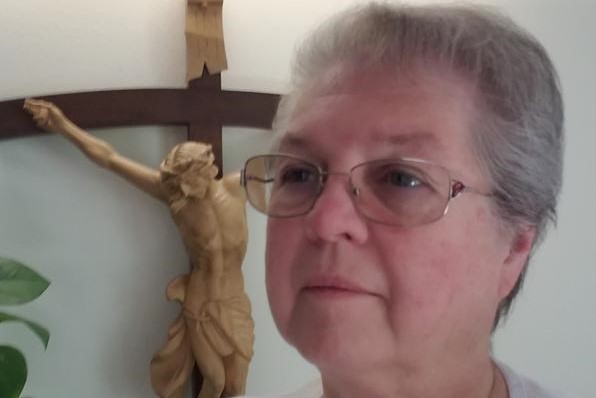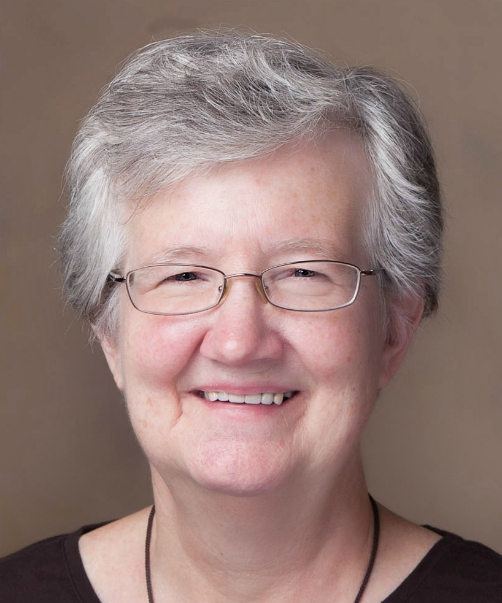
Sr. Jane Mary Gawlik (Courtesy of the Felician Sisters)
Children are taught to count to 10 when they're angry. Commercials remind us to grab a candy bar when we're "hangry." People wrestling with tough choices often are encouraged to "sleep on it." Why? Because we often think poorly and act even worse when our minds and bodies are hurting or unsettled. Alone or with a partner, discuss:
- When have you or someone you know made impulsive or regrettable choices under stress?
- What kind of guidance or support has someone given you during challenging times?
This is a story of transformation. It's much bigger than the change within the empty walls of an old convent. It's about change that happens among weary, worried migrants and the people who serve them. Be attentive to those changes, as well as small ways in which your outlook might change as you read.
A new chapter for a Felician convent
A new chapter in the history of a former Felician Sisters' convent in New Mexico began April 22, when temporary housing was provided for 50 asylum-seekers. These people, mostly from Central America, entered the United States legally, were processed at the border and have families sponsoring their entry.
Preparations for their temporary stay have been in process since mid-March, when Catholic Charities asked if the convent could serve as a housing site. Four other sites in the area, more than 200 miles north of the border, provide housing to several busloads of people arriving every week. Felician Sr. Jane Mary Gawlik, who lives at the convent, said, "We were asked to take one of the buses with the prospect of more busloads as the need arises."
The reality of this operation suddenly hit when a Red Cross truck arrived with 100 cots and blankets. The truck arrived early, prior to when volunteers were expected. However, calls for help went out, and a swarm of helpers quickly arrived. With all the helping hands, the task of assembling the cots took about two hours. The former sisters' care center has taken on a new shade of green, as each of the rooms now houses four cots.
The volunteers assisting with different facets of this operation represent almost every faith denomination in the area. "We are all one church here," noted Sister Jane, who said it was a blessing to have this ecumenical experience during Holy Week.
Catholic Charities had been preparing for a week before the first bus arrived, transforming the convent to receive guests and organizing areas for the different teams.
One team prepared food and accepted meal donations. Sister Jane was amazed at the number of churches and groups willing to bring in meals, as well as the volunteers who keep the kitchen and dining room clean.
A hospitality team welcomes arriving guests and responds to their needs and questions. A transportation team drives guests to the airport or bus station. Another team cleans rooms, hallways, bathrooms and showers when each group leaves.
The laundry team washes bedding and towels and prepares rooms for the next group. The intake team works with families to get necessary information and communicates with family sponsors for tickets and travel arrangements.
To avoid using disposable goods, the families use the convent dishes and silverware, so volunteer dishwashers are needed. Another group sorts donated clothes to give to arriving guests. They also organize other items, such as socks and shoes.
Finally, a medical team that includes volunteer doctors and nurses assists with health needs.
A small army of volunteers — many Spanish-speaking — work endless hours to help with the guests. Even the guests who are there for a few days join in helping with housekeeping tasks.
Charts are posted to inform volunteers and guests of room assignments, meal times, travel dates and departure times. Sister Jane admitted that the system is not perfect but said it has worked very well so far. Everyone looks for ways that things can be done more efficiently.
Sister Jane told about her experience of the first day:
"I was to meet and direct the first bus. I stood watching as each adult or child stepped off the bus… the look of gloom, fear, fatigue was overwhelming. As they walked to the door, they were escorted by a hospitality person into the building. The basic necessity of using the restrooms was first. A large container of small toys also stood by the door. Each child was allowed to pick a toy to keep… a small way to give comfort and say, 'All will be OK.' The medical team also quickly checked everyone, trying to spot health issues, which would then be taken care of.
"We have learned from groups already working with bus arrivals that hydration is critical, so water and fruit are an initial snack for each guest upon arrival, followed by a meal later."
The intake process begins after supper. Guests find new clothes in the distribution room to put on after they shower; their old clothes are either thrown out or washed to take with them. By the time the guests are ready to sleep, each has had a nourishing meal, has taken a shower, has fresh clothing and a plan for how they will continue the journey to their new destination.
Amazing transformation
There was a big change in the guests overnight. As Sister Jane came to see everyone the next morning, she said she was amazed at the transformation she heard and saw. "Even before I arrived in the dining room, I heard children laughing and energetic voices. This was not the case upon arrival."
After breakfast on Tuesday morning, 16 guests were on their way to the airport and, by Thursday afternoon, all but three were gone. The three would leave as soon as tickets from their family could be processed.
Because of a major event in the area, another group of 46 asylum seekers arrived at the convent. Teams of volunteers came with this group, giving the volunteers who'd worked Monday some much-needed rest.
In a quiet moment, Sister Jane reflected, "It is very sad that this situation even exists; people fleeing their home countries looking for a safer way to live. But it is also heartwarming to meet so many loving and caring people who give of their time and talents to help with this critical situation."
She tries to be as present as possible and, as she makes her way through the hallways to see how she can help, she meets people from almost every faith denomination. "We all speak the same language of caring and loving, and as I spend time chatting and getting to know them, I hear the same thing from everyone... how grateful they are to be able to be in our convent and to help in whatever way they can. Everyone loves our convent home and the peace they feel being here."
"I do believe that our Felician foundress, Blessed Mary Angela, would approve of our efforts. We ask only for your prayerful support for all the many people involved in this humanitarian situation," she said.
Sr. Jane Mary Gawlik observed migrants who arrived showing gloom, fear and fatigue. Overnight, this changed to energy and laughter. Alone or with a partner, discuss:
- Name three things you can see or touch, and one thing you can't see or touch, that the sisters and their volunteers provided to the migrants.
- How might the support provided at the convent change the migrants? How might this service affect the volunteers who give it?
After Jesus died, rose and ascended into heaven, his disciples were an unsettled bunch. The Acts of the Apostles tells how the Holy Spirit transformed them, empowering them to inspire the young church. This is how Acts describes those early days:
"They devoted themselves to the teaching of the apostles and to the communal life, to the breaking of the bread and to the prayers. Awe came upon everyone, and many wonders and signs were done through the apostles. All who believed were together and had all things in common; they would sell their property and possessions and divide them among all according to each one's need. Every day they devoted themselves to meeting together in the temple area and to breaking bread in their homes. They ate their meals with exultation and sincerity of heart, praising God and enjoying favor with all the people. And every day the Lord added to their number those who were being saved."
- John's Gospel describes the apostles as living in fear after Jesus was crucified. Acts shows that they were changed people, changing other people. What was it about them that and their way of life that attracted and enriched people?
- The early Christians at their meals with exultation. They appreciated and rejoiced for the food they shared. How might you better appreciate the food and other gifts you receive?
Pope Francis recently shared a special message with the young people of the world. He emphasized that those who serve poor and marginalized people often discover that they receive much more than what they give. He encouraged young people to get involved and make a difference in people's lives. Pope Francis wrote:
"Do not be afraid to go and bring Christ into every area of life, to the fringes of society, even to those who seem farthest away and most indifferent. The Lord seeks all; he wants everyone to feel the warmth of his mercy and his love. He invites us to be fearless missionaries wherever we are and in whatever company we find ourselves."
"Christus Vivit," post-synodal apostolic exhortation to young people and the entire people of God, March 25, 2019
- Sr. Jane Mary Gawlik said that volunteers at the convent "all speak the same language of caring and loving." Is it naïve to think that these values can override the language gap between the migrants and volunteers? Why or why not?
- What gifts or hopes do you have that might help make you a good volunteer in a setting like the convent's migrant ministry?
In addition to their work at the New Mexico convent, the Felician Sisters partner with other organizations that support migrants along the U.S.-Mexico border. Discover more about these efforts and how you can support them here.
To make a difference, it's important to take part in direct service that addresses immediate needs while also working for social change that helps solve the root causes of problems. Here are suggestions for both approaches:
- The American Red Cross provides bedding and supplies at the Felician convent and other facilities that help migrants. Click here to find out how you and your classmates can support Red Cross efforts in your town and around the world.
- Support the advocacy efforts of the Justice for Immigrants campaign and encourage U.S. leaders to allow more refugees into our country and increase funding to support them.
Jesus, your first followers inspired others with their love.
Through their caring, they helped people in need and led many to a new way of life.
Send your Holy Spirit upon your people today, Lord, so that we might welcome and nourish the strangers at our borders and in our midst.
Through our care, may they know your love.
Amen.
Tell us what you think about this resource, or give us ideas for other resources you'd like to see, by contacting us at education@globalsistersreport.org
